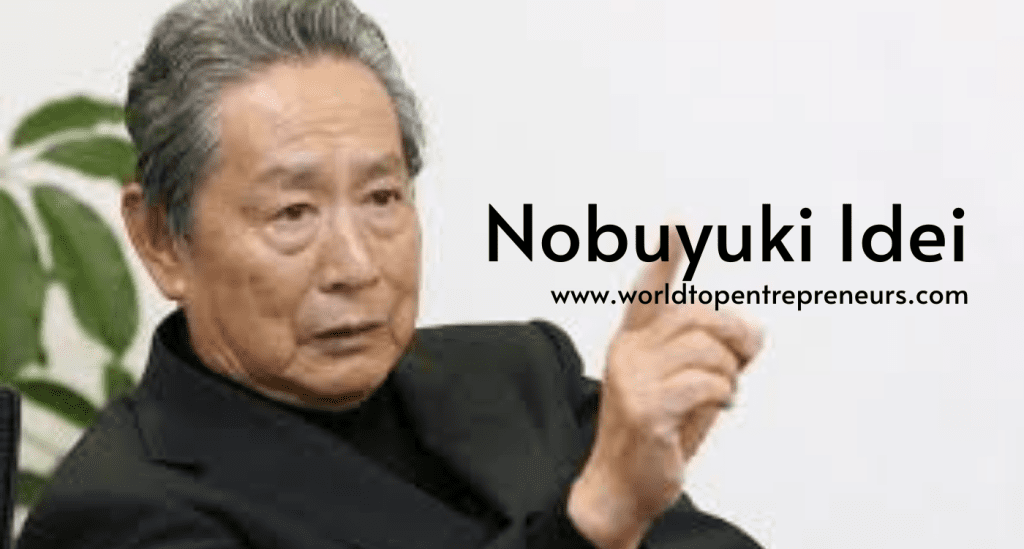Nobuyuki Idei, the visionary behind Sony’s remarkable evolution in the 21st century, stands as a pivotal figure in the company’s storied history. His tenure as CEO and Chairman not only rejuvenated Sony but also set the stage for its expansion into new and transformative areas of technology and entertainment. This article explores Idei’s journey, his impact on Sony, and his enduring legacy in shaping the modern tech and entertainment landscape.
Early Life and Career Beginnings
Nobuyuki Idei was born on November 22, 1937, in Tokyo, Japan. His early life in post-war Japan was marked by a period of significant social and economic change. Growing up in this dynamic environment, Idei developed a keen interest in technology and business, which would shape his future career.
Idei’s academic journey led him to Waseda University, one of Japan’s most prestigious institutions. He graduated with a degree in Economics, which provided him with a solid foundation in business principles. After completing his studies, Idei began his professional career at Dentsu, a leading advertising agency in Japan. It was here that he honed his skills in marketing and strategic planning, laying the groundwork for his future role in Sony.
Joining Sony and Early Achievements
Idei joined Sony in 1960, a pivotal moment in his career that would eventually lead him to the upper echelons of the company. His initial role involved working in Sony’s marketing division, where he quickly made a name for himself with his innovative ideas and strategic insights. Idei’s ability to understand market trends and consumer behavior helped him rise through the ranks, earning him a reputation as a forward-thinking executive.
During the 1980s, Idei played a key role in the development and marketing of some of Sony’s most iconic products. One of his notable contributions was in the promotion of the Sony Walkman, a revolutionary portable cassette player that changed the way people listened to music. Idei’s strategic marketing efforts helped propel the Walkman to global success, establishing Sony as a leading brand in consumer electronics.
The Rise to Leadership
Idei’s contributions to Sony did not go unnoticed. In 1995, he was appointed as the President and CEO of Sony Corporation, marking the beginning of a transformative era for the company. His appointment came at a time when Sony was facing increased competition and challenges in the rapidly evolving tech landscape.
As CEO, Idei embarked on a mission to rejuvenate Sony and position it for long-term success. His leadership style was characterized by a focus on innovation, global expansion, and strategic investments in new technologies. Idei’s vision for Sony was not only about maintaining its leadership in electronics but also about embracing new opportunities in entertainment and digital media.
Strategic Vision and Innovation
One of Idei’s most significant contributions was his emphasis on innovation and technological advancement. Recognizing the importance of staying ahead in a competitive market, he spearheaded several initiatives aimed at pushing the boundaries of technology and enhancing Sony’s product offerings.
- Embracing Digital Technology: Under Idei’s leadership, Sony made a strategic shift towards digital technology. This included the development of new products and services that leveraged digital media and connectivity. Idei was instrumental in the launch of the PlayStation 2, a gaming console that became one of the best-selling consoles of all time. The PlayStation 2’s success not only solidified Sony’s position in the gaming industry but also demonstrated Idei’s commitment to innovation.
- Expanding into Entertainment: Idei recognized the importance of integrating technology with entertainment content. In 2001, Sony acquired Columbia Pictures, a move that expanded its presence in the film and television industry. This acquisition was part of Idei’s broader strategy to create synergies between Sony’s technology and entertainment businesses, positioning the company as a leading player in both sectors.
- Pioneering New Technologies: Idei’s tenure saw Sony pushing the envelope in various technology sectors. The company invested in research and development to explore new areas such as high-definition television, digital music, and mobile communications. One notable example was the introduction of Blu-ray technology, which became the standard for high-definition video and provided Sony with a competitive edge in the home entertainment market.
Challenges and Adaptations
Despite his many successes, Idei’s leadership was not without challenges. Sony faced significant competition from other tech giants, as well as shifts in consumer preferences and market dynamics. Idei’s ability to navigate these challenges was a testament to his strategic acumen and adaptability.
- Competition and Market Shifts: The tech industry was becoming increasingly competitive, with new players emerging and existing companies expanding their product lines. Idei had to contend with rivals such as Microsoft and Apple, who were making significant inroads into the gaming and consumer electronics markets. To address these challenges, Idei focused on differentiating Sony’s products and creating unique value propositions.
- Financial Performance and Restructuring: During Idei’s tenure, Sony faced periods of financial difficulty and restructuring. The company had to address issues related to profitability and operational efficiency. Idei implemented several restructuring initiatives to streamline operations, reduce costs, and improve financial performance. These efforts were aimed at ensuring Sony’s long-term sustainability and competitiveness.
Legacy and Impact
Nobuyuki Idei’s legacy at Sony is characterized by his visionary leadership and strategic foresight. His contributions to the company had a lasting impact on the technology and entertainment industries. Idei’s emphasis on innovation, digital technology, and global expansion helped shape Sony’s trajectory and establish it as a leading player in multiple sectors.
- Transformative Leadership: Idei’s leadership style was marked by a focus on innovation and strategic thinking. His ability to anticipate market trends and adapt to changing conditions was instrumental in Sony’s success during his tenure. Idei’s vision for the company laid the foundation for future growth and positioned Sony as a leader in both technology and entertainment.
- Technological Advancements: Idei’s tenure saw Sony make significant advancements in technology, from digital media and gaming to high-definition video. The company’s investments in research and development helped drive innovation and set new industry standards. Idei’s commitment to technological excellence ensured that Sony remained at the forefront of the tech industry.
- Entertainment Integration: The acquisition of Columbia Pictures and other strategic moves in the entertainment sector reflected Idei’s vision of integrating technology with content creation. This approach allowed Sony to leverage its technological expertise in the entertainment industry and create synergies between its various business units.
Personal Reflections and Future Outlook
As Nobuyuki Idei reflects on his career, he can take pride in the impact he has had on Sony and the broader technology and entertainment landscape. His journey from a young executive to a transformative leader is a testament to his dedication, creativity, and strategic vision.
Looking to the future, Sony’s continued success will be influenced by the principles and values established during Idei’s tenure. The company’s focus on innovation, technological advancement, and entertainment integration remains central to its strategy. As new technologies and trends emerge, Sony will build on Idei’s legacy to drive progress and create products that resonate with consumers.
Idei’s impact extends beyond his achievements at Sony; it encompasses a broader influence on the technology and entertainment industries. His contributions serve as a source of inspiration for leaders and innovators, demonstrating the power of visionary thinking and strategic leadership.
Conclusion
Nobuyuki Idei’s career is a remarkable story of leadership, innovation, and transformation. His role in rejuvenating Sony and guiding it through a period of significant change is a testament to his strategic vision and commitment to excellence. Idei’s legacy at Sony is a reflection of his dedication to pushing the boundaries of technology and integrating it with entertainment. As Sony continues to evolve and adapt to new challenges, Nobuyuki Idei’s contributions will remain an enduring source of inspiration and a reminder of the impact of visionary leadership in the world of technology and entertainment.





















